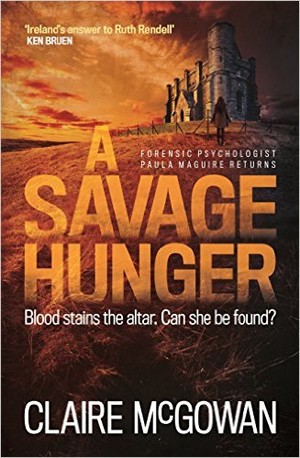
Claire McGowan’s Paula Maguire series has already garnered high praise. On the strength of my entry point into the series with this, the fourth novel, I can certainly see why that’s the case. Forensic psychologists have become almost a cliché in recent crime fiction, but Paula’s background, personality and empathetic approach to missing persons cases make her particularly memorable.
Alice Morgan is an English student who has gone missing from her college in Northern Ireland. She was last seen at a remote religious shrine, and the holy relic containing the bones of a saint has disappeared along with her. Alice’s father is a life peer and senior civil servant in the Home Office, so the pressure is on for the police to find her as soon as possible, preferably unharmed. Missing girls are Paula’s specialty, so she is drawn into the investigation, although her own wedding day is just a week away.
We are once again in Ballyterrin, Paula’s home town on the border between Northern Ireland and the Republic, but there are many references to the harrowing hunger strikes in the notorious Maze prison in Belfast in 1981. The connection with the present day is not immediately apparent, but there is a disturbing parallel. Alice Morgan is very thin, and prone to hunger strikes of a different sort. In fact, she was hospitalised for anorexia as a teenager. Could that be the reason why her parents and college friends seem strangely unconcerned about her disappearance? Do they suspect that it’s nothing more than a resurgence of her illness and need for a little headspace away from the world? But then what is the connection with the disappearance on the very same spot of another girl, Yvonne O’Neill, three decades ago?
We get snippets from Alice’s past, which give us some clues about her personality and her struggle with anorexia. Most of the book, however, is thankfully firmly focused on the investigation, although things get very complicated in Paula’s personal life when a past lover reappears on the scene and threatens to spoil her wedding day. If you are new to the series, this is probably where it would be helpful to start with the first book, The Lost, to get a firmer grasp of the issues involved. However, the plot itself is nicely self-contained with echoes of the past very audible still, as one might expect in Northern Ireland.
It’s this window into an unknown world which is most enjoyable about the book. The police force is learning to work together without showing allegiance to either the Catholic or Protestant communities, disgruntling everyone equally instead of being seen as a tool of oppression. Yet the past still casts long, resentful shadows even in these more conciliatory times. As the heat rises and tempers fray, you have the annual season of marches and riots. All this underlying complexity is presented with realism but also humour. The local speech patterns and ways of thinking are colourfully conveyed, and the blend of personal and professional is in just about perfect proportion.
There are some minor kinks in the story concerning the wedding scenario and the plausibility of the denouement, but it is nevertheless an intriguing book which will have me searching out the previous ones in the series. In just four years, McGowan has established herself as a voice to be reckoned with in crime fiction, and adds a new slant to the genre which stays clear of the type of noir seen in some other Northern Irish novels.
We’ve previously reviewed the first book in the series, The Lost, as well as Claire McGowan’s debut standalone thriller The Fall. You can also find an interview with the author here.
Headline
Print/Kindle/iBook
£3.99
CFL Rating: 4 Stars